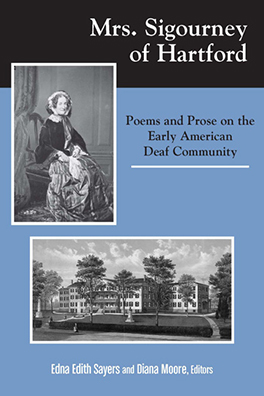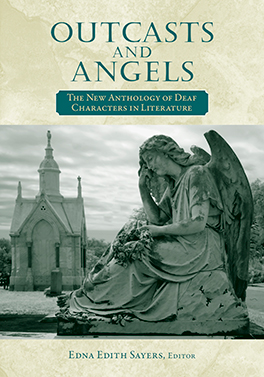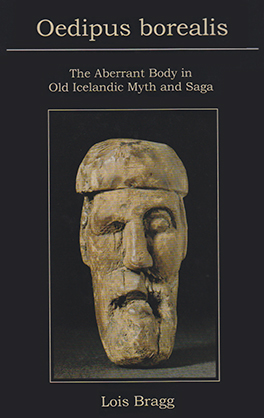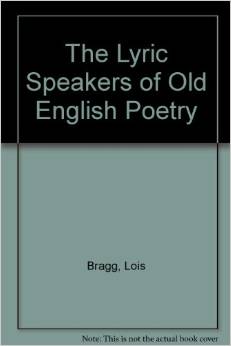N.B.: Some of these publications are also listed on the Literary and Disability Studies page.
Books
 Edna Edith Sayers and Diana Moore. Mrs. Sigourney of Hartford: Poems and Prose on the Early American Deaf Community. Washington, D.C.: Gallaudet University Press, 2013.
Edna Edith Sayers and Diana Moore. Mrs. Sigourney of Hartford: Poems and Prose on the Early American Deaf Community. Washington, D.C.: Gallaudet University Press, 2013.
Lydia Huntley was born in 1791 in Norwich, CT, the only child of a poor Revolutionary war veteran. But her father’s employer, a wealthy widow, gave young Lydia the run of her library and later sent her for visits to Hartford, CT. After teaching at her own school for several years in Norwich, Lydia returned to Hartford to head a class of 15 girls from the best families. Among her students was Alice Cogswell, a deaf girl soon to be famous as a student of Thomas Hopkins Gallaudet and Laurent Clerc.
Lydia’s inspiration came from a deep commitment to the education of girls and also for African American, Indian, and deaf children. She left teaching to marry Charles Sigourney, then turned to writing to support her family, publishing 56 books, 2,000 magazine articles, and popular poetry. Lydia Sigourney never abandoned her passion for deaf education, remaining a supporter of Gallaudet’s school for the deaf until her death. Yet, her contributions to deaf education and her writing have been forgotten until now.
The best of Lydia Sigourney’s work on the nascent Deaf community is presented in this new volume. Her writing intertwines her mastery of the sentimentalism form popular in her day with her sharp insights on the best ways to educate deaf children. In the process, Mrs. Sigourney of Hartford reestablishes her rightful place in history.
 Edna Edith Sayers, ed. Outcasts and Angels: The New Anthology of Deaf Characters in Literature. Washington, D.C.: Gallaudet University Press, 2012.
Edna Edith Sayers, ed. Outcasts and Angels: The New Anthology of Deaf Characters in Literature. Washington, D.C.: Gallaudet University Press, 2012.
In 1976, Trent Batson and Eugene Bergman released their classic Angels and Outcasts: An Anthology of Deaf Characters in Literature. In it, they featured works from the 19th and 20th centuries by well-known authors such as Charles Dickens and Eudora Welty. They also presented less-well-known deaf authors, and they prefaced each excerpt with remarks on context, societal perceptions, and the dignity due to deaf people. Since then, much has transpired, turning around the literary criticism regarding portrayals of deaf people in print. Edna Edith Sayers reflects these changes in her new collection Outcasts and Angels: The New Anthology of Deaf Characters in Literature.
Sayers mines the same literary vein as the first volume with rich new results. Her anthology also introduces rare works by early masters such as Daniel Defoe. She includes three new deaf authors, Charlotte Elizabeth, Howard T. Hofsteater, and Douglas Bullard, who offer compelling evidence of the attitudes toward deaf people current in their eras. In search of commonalities and comparisons, Sayers reveals that the defining elements of deaf literary characters are fluid and subtly different beyond the predominant dueling stereotypes of preternaturally spiritual beings and thuggish troglodytes.
 Lois Bragg, Oedipus borealis: The Aberrant Body in Medieval Iceland. Fairleigh Dickinson UP, 2004.
Lois Bragg, Oedipus borealis: The Aberrant Body in Medieval Iceland. Fairleigh Dickinson UP, 2004.
Oedipus borealis is a discussion of aberrance in the mythic and legendary hero as he appears in thirteenth-century Icelandic narratives, and in the quasihistorical figures in the saga literature who are modeled on him.
“Written by a Professor of English at Gallaudet University and an expert on Germanic languages, literatures, and mythologies, Oedipus Borealis: The Aberrant Body In Old Icelandic Myth And Saga poses the argument that many well known figures in the Icelandic saga are based on mythic prototypes. Drawing commonalities between saga heroes and mythic figures such as a physical deformity linked with sexual deviance and supernatural powers, and noting that modern narratives sharply contrast with the myth and saga by establishing aberrance as the sign of a villain or victim, Oedipus Borealis offers a scholarly and studious study of the symbolism within myths including that Oedipus, tales of gods and giants, Egil Bald-Grim’s son, and other characters as well as the saga skalds themselves. A heavily researched and evenly weighed study that succinctly retells myths as needed to espy core similarities within the ancient tales, recommended for academic library mythology study and reference shelves.” Midwest Book Review:
 Lois Bragg, The Lyric Speakers in Old English Poetry. (Fairleigh Dickinson UP, 1991).
Lois Bragg, The Lyric Speakers in Old English Poetry. (Fairleigh Dickinson UP, 1991).
“In The Lyric Speakers of Old English Poetry Lois Bragg discuses poems normally discussed as short lyrics (“The Dram of the Rood” and “The Wanderer”) and brief lyric passages from longer works (Beowulf and the signed poems of Cynewulf). By so doing, seh cuts through the red tape of the generic categories assigned by modern scholars, not by the Anglo-Saxons–heroic elegy and planctus, for example–and enables readers to appraoch the poems from a fresh point of view. In addition, she makes a major contribution to contemporary study of the transition from orality to literacy during the Old English period, a subject also addressed by Katherine O’Brien O’Keefee in Visible Song: Transitional Literacy in Old English Verse (1990)…. Bragg reminds us of ‘the old joke that Old English literature is a small body of poetry completely surrounded by scholars’ (p. 138). By analyzing the lyrics as being of interest to a modern audience while contextualizing them in their manuscript culture, Bragg makes it possible for the lyrics to be surrounded by an audience not of scholars but of modern readers.” – Rvw. by Alexandra Hennessey Olsen, Speculum Vol. 69, No. 2, Apr. 1994.
Articles
Edna Edith Sayers. “Experience, Authority, and the Mediation of Deafness: Chaucer’s Wife of Bath.” A World of Difference: Essays on Disability in the Middle Ages, ed. Joshua R. Eyler (Ashgate, 2010): chapter 6.
Edna Edith Sayers and Diana Gates. “Lydia Huntley Sigourney and the Beginnings in American Deaf Education in Hartford: It Takes a Village.” Sign Language Studies 8.4 (2008): 369-411.
Edna Edith Sayers. “Night Vision: Blind Characters in John Gardner’s Fiction.” Disability Studies Quarterly Winter 2006.
Lois Bragg. “Norse Sagas.” In The Encyclopedia of Disability, ed. Gary S. Albrecht. Thousand Oaks, California: Sage Press, 2005.
Lois Bragg. “Telling Silence: Alingualism in Old Icelandic Myth, Legend, and Saga.” Journal of Indo-European Studies 32 (2004): 267-98.
Lois Bragg. “The Hard of Hearing and the Hardly Heard in Henry Green’s Novels of the 1940s.” Journal of Modern Literature 26.2 (2003): 100-112.
Lois Bragg. “Impaired and Inspired: The Makings of an Icelandic Poet.” In Madness, Disability, and Social Exclusion: The Archaeology and Anthropology of ‘Difference,’ ed. Jane Hubert. One World Archaeology, no. 40. (London: Routledge, 2000): 128-143. Discussion of the role of disability in the character of Thormódr Kólbrúnsskáld, an eleventh-century Icelandic poet who died defending St. Olaf: he stuttered and had a crippled right arm.
Lois Bragg and William Sayers. “Proust’s Prescription.” Medicine and Literature 19 (2000): 163-81. Analysis of epiphanies in In Search of Lost Time, demonstrating that each turns on an issue of chronic illness.
Lois Bragg. “Runes and Readers: In and Around ‘The Husband’s Message,’” Studia Neophilolgia (Uppsala) 71 (1999): 34-50. Literacy in Dark-Age England.
Lois Bragg. “Generational Tensions in Sturlunga Saga,” Arkiv för nordisk filologi (Lund) 116 (1997): 5-34. Father/son relations and male roles in 13th-c. Icelandic narrative.
Lois Bragg. “From the Mute God to the Lesser God: Disability in Medieval Celtic and Old Norse Literature.” Disability & Society 12.2 (April 1997): 165-77.
Lois Bragg. “Disfigurement, Disability, and Dis-integration in Sturlunga Saga,” alvíssmál (Berlin) 4 (1994): 15-32. Disability in 13th-c. Icelandic narrative.
Lois Bragg. “Modes of the Old English Metrical Charms.” The Comparatist 16 (1992): 3-23. Rpt. in New Approaches to Medieval Textuality, ed. Mikle Dave Ledgerwood (New York: Peter Lang, 1998). Relation between magic and figurative language in vernacular spells.
Lois Bragg. “Old English Dual Pronouns and their Poetic Uses.” Language and Style 22 (1989): 337-49. Discusses a kind of pronoun that does not exist in Modern English and known today mostly from sign languages.
Lois Bragg. “’Wulf and Eadwacer,’ ‘The Wife’s Lament,’ and Women’s Love Lyrics of the Middle Ages.” Germanische-Romanische Monatsschrift 39 (1989): 257-68. Argues for a connection with continental women’s lyrics and against the received notion that OE women’s poetry is an adaptation of male-speaker conventions.
Lois Bragg. “Whaleroads and Meadseats: Four Ways of Translating Beowulf.” Humanities Education 3 (1986): 63-77. Translation theory and pedagogical applications.
Lois Bragg. “Sir Gawain and the Green Knight and the Elusion of Clarity.” Neuphilologische Mitteilungen 86 (1985): 482-88. Analysis of romance hero’s ethics.
Lois Bragg. “Color Words in Beowulf.” Proceedings of the Patristic, Mediaeval, and Renaissance Conference 7 (1982): 47-55. Examines adjectives denoting color in a culture that had a different color schema that that of modern Westerners.
Lois Bragg. “John Erskine.” Dictionary of Literary Biography Vol. 9, ed. James J. Martine (Detroit: Gale Research, 1981).
Lois Bragg. “Dorothy Canfield Fisher.” Dictionary of Literary Biography, Vol. 9, ed. James J. Martine (Detroit: Gale Research, 1981).
Lois Bragg. “Ernest Poole.” Dictionary of Literary Biography, Vol. 9, ed. James J. Martine (Detroit: Gale Research, 1981).
Selected Unpublished Papers
Edna Edith Sayers. “Narrative Eugenics: Disability in Norse Myth and Saga and its Displacement in Art, Literature, and Cinema.” Keynote address, 25th Annual International Conference on Medievalism, Kent State University at Stark, 18-20 October 2012.
Lois Bragg. “The Legendary Offa in Denmark and England: The King’s Mute Boyhood.” South Atlantic MLA, Roanoke, 2004.
Lois Bragg. “Deft Mutes and Daft Brutes: Old Icelandic Tales of Dysglossia,” MLA 1998.
Lois Bragg. “Muteness and the Supernatural in Early Iceland,” invited lecture at University of Iceland, 24 March 1998.
Miscellaneous Short Publications: Reviews & Advocacy
Edna Edith Sayers. Rvw. of The Familiar Enemy: Chaucer, Language, and Nation in the Hundred Years War, Ardis Butterfield (Oxford UP, 2009). In Mediaevistik 24 (2011): 853-55.
Edna Edith Sayers. Rvw. of Say What I Am Called: The Old English Riddles of the Exeter Book and the Anglo-Latin Riddle Tradition, Dieter Bitterli (U Toronto P, 2009). In Mediaevistik 24 (2011): 486-89.
Edna Edith Sayers. Rvw. of Women and Disability in Medieval Literature, Tory Vandeventer Pearman (Palgrave Macmillan, 2010). In Journal of Religion, Disability, and Health 15.3 (2011): 325-27.
Edna Edith Sayers. Rvw. of “Vignettes of the Deaf Character” and Other Plays, Willy Conley (Washington: Gallaudet UP, 2009). In Clerc Scar 15.4 (13 October 2009).
Edna Edith Sayers. Rvw. of Writing Deafness: The Hearing Line in Nineteenth-Century American Literature, Christopher Krentz (Chapel Hill: North Carolina UP, 2007). In Deaf History International Newsletter 39 (Summer 2009): 10.
Edna Edith Sayers. Rvw. of Ovid’s Art and the Wife of Bath: The Ethics of Erotic Violence, Marilynn Desmond (Ithaca: Cornell UP, 2006). In The Medieval Review, 2007.
Lois Bragg. Rvw. of Pagans, Tartars, Moslems, and Jews in Chaucer’s Canterbury Tales, Brenda Deen Schildgen (Gainsville: University Press of Florida, 2001). In Studies in the Age of Chaucer 25 (2003): 426-29.
Lois Bragg. Rvw. of Chaucer and Costume: The Secular Pilgrims in the General Prologue (Chaucer Studies XXVI), Laura F. Hodges. (Cambridge: D. S. Brewer, 2000). In Studies in the Age of Chaucer 24 (2002): 408-11.
Lois Bragg. Rvw. of Assembling the Lyric Self: Authorship from Troubadour Song to Italian Poetry Book, Olivia Holmes (Minneapolis: U Minnesota P, 2000). In Annali d’Italianistica 18 (2000): 477-80.
Lois Bragg. Rvw. of The Body and Physical Difference: Discourses of Disability, David T. Mitchell and Sharon L. Snyder, eds. (Ann Arbor: U Michigan P, 1997). In Disability Studies Quarterly 18.3 (March 1999 for Summer 1998): 258-62.
Lois Bragg. “Planet of the Normates,” review essay on Extraordinary Bodies, Rosemarie Garland Thomson (New York: Columbia UP, 1997), Freakery, ed. Rosemarie Garland Thomson (New York: NYUP, 1996), and Monster Theory, ed. Jeffery Jerome Cohen (Minneapolis: U Minnesota P, 1996). In American Anthropologist, March 1998: 177-80.
Lois Bragg. Rvw. of Silent Poetry: Deafness, Sign, and Visual Culture in Modern France, Nicholas Mirzoeff (Princeton: UP, 1995). In Gallaudet Today Fall 1997: 29.
Lois Bragg. Report to MLA on access for deaf members, 14 February 1996: 29 pp.
Lois Bragg. Rvw. of The Cultural World of “Beowulf,” John M. Hill (Toronto, UP, 1995). In South Atlantic Review 61.1 (January 1996): 126-29.
Lois Bragg. Rvw. of Thinking about Beowulf, James W. Earl (Stanford: UP, 1994). In South Atlantic Review 60.3 (September 1995): 113-16.
Lois Bragg. Rvw. of Humiliation and Other Essays on Honor, Social Discomfort, and Violence, William Ian Miller (Ithaca: Cornell UP, 1993). In Scandinavian Studies 66 (1994): 469-71.